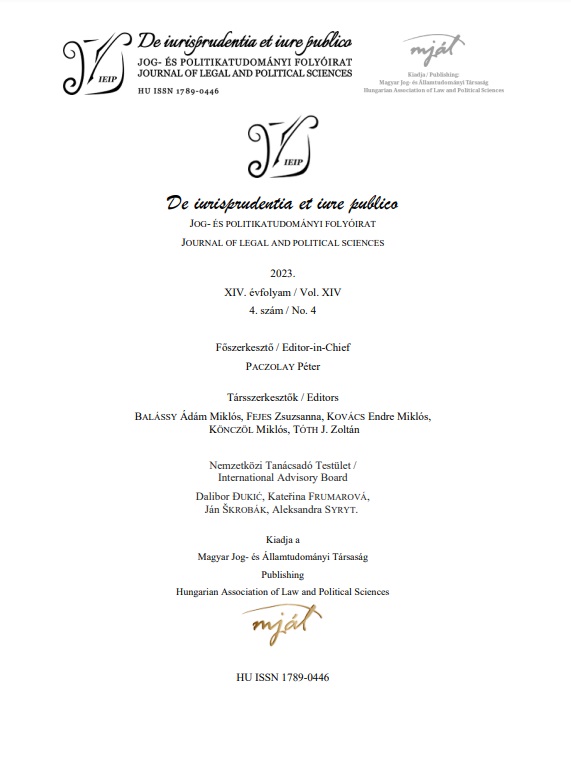DIEIP 2023. XIV. évfolyam / Vol. XIV. 4. szám / No. 4.
Articles
Abstract
This paper explores the inherent uncertainty within legal systems, stemming from the nature of legal interpretation, judicial decision-making, and applied legal procedures. It highlights the variable, context-dependent nature of legal interpretation and the subjective judgments in judicial decision-making, influenced by both internal and external factors. The analysis reveals the limitations of legal predictability and completeness, emphasizing the lack of a legal system capable of addressing every possible situation. The paper also discusses the influence of subjective factors in legal interpretation and the challenges in adapting abstract norms to specific cases, underscoring the complex relationship between reality, truth, and the role of language in the social system.
Keywords: legal uncertainty, interpretation, judicial decision-making, legal systems, subjectivity in law
Abstratct
The Universal Declaration of Human Rights was adopted as reaction to the cruelties of National Socialism. Therefore, it is surprising that the text of the Covenant on the right to trial in court fails to mention that courts must be “established by law.” In addition to examining judicial independence under the Nazi regime the author attempts to give an explanation to this gap in the Declaration. The special status of judicial independence and impartiality within procedural guarantees is also discussed. The author concludes that judges’ independence and impartiality may compensate for restrictions on other procedural guarantees while limitations on judicial independence and impartiality may not be counterbalanced by any other procedural safeguard.
Keywords: Tribunals „established by law”, judicial independence; judges’ impartiality; procedural guarantees; fact finding and truth in the criminal process; National Socialism.
Abstratct
The aim in psychiatry field in 19th century was build total institutions for patients. The sophistication of the chemical and physical methods/protocolls of mental medicine began in the 20th century. In the second half of the 20th century, we can already talk about the closing of large-scale, total psychiatric institutions in all countries of the European continent and in USA, which seemed to be a forward-looking program. The period of deinstitutionalization was prompted by the wider spread of human rights and group rights of patients, and the development of legal practices. Instead of impersonal mental institutions, the goal was to build a more humane, bio-psycho-social care system that prioritizes physical freedom in all countries. In Hungary, the democratization of psychiatric services can be directly linked to the period before and after the regime change, a delay is characteristic of the development of the field. The study examines some issues of the domestic institutionalization of psychiatry in an interdisciplinary point of view.
Keywords: asylums, total institutions, deinstitutionalization, deviance-heterotopy
Abstract
The French Revolution and the Napoleonic Wars most significantly affected Europe and also caused fundamental changes in America. The loyal attitude of the Hungarian nation toward the Habsburgs during these decades was fully reasonable, although Napoleon tried to provoke a rebellion in Hungary against the Habsburgs. Maria Leopoldina of Habsburg, Archduchess of Austria and Royal Princess of Hungary spent her childhood in these decades full of tension. Very interesting episode, a good part of the imperial and royal family spent the summer of 1809 in Eger, we know letters written by Leopoldina from Buda and Eger to his father.
Keywords: Kingdom of Hungary, Napoleonic Wars, Revolution, Maria Leopoldina, Brazil
Abstract
The aim of the study is to show the proportion of cases in which the courts of the V4 (Czech Republic, Poland, Hungary and Slovakia) have referred to the Court of Justice of the European Union for a preliminary ruling on financial law issues, and the type of cases in which they have sought guidance. At https://curia.europa.eu, I filtered the data and information available on the basis of requests for preliminary rulings on customs cooperation, customs valuation, common customs tariff, customs union, indirect taxation, excise duties, value added tax, internal taxation, taxation, and by tax category I compare them with each other. If, on the basis of the questions raised, there are tax issues whose interpretation has been questioned in other Member States as well, I will highlight and analyse them separately. I will then draw conclusions on the basis of the issues raised.
Keywords EU law, preliminary ruling procedure, taxation, customs law, V4 member states

